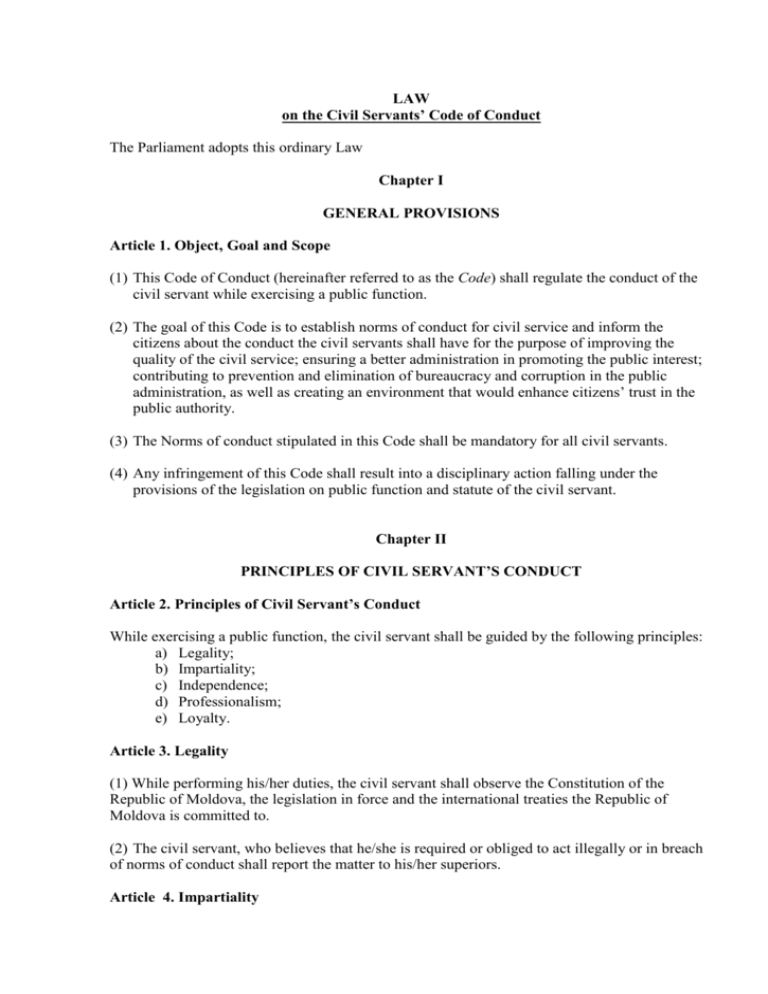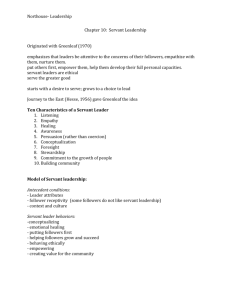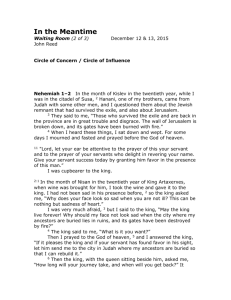Code of Conduct for Civil Servants
advertisement

LAW on the Civil Servants’ Code of Conduct The Parliament adopts this ordinary Law Chapter I GENERAL PROVISIONS Article 1. Object, Goal and Scope (1) This Code of Conduct (hereinafter referred to as the Code) shall regulate the conduct of the civil servant while exercising a public function. (2) The goal of this Code is to establish norms of conduct for civil service and inform the citizens about the conduct the civil servants shall have for the purpose of improving the quality of the civil service; ensuring a better administration in promoting the public interest; contributing to prevention and elimination of bureaucracy and corruption in the public administration, as well as creating an environment that would enhance citizens’ trust in the public authority. (3) The Norms of conduct stipulated in this Code shall be mandatory for all civil servants. (4) Any infringement of this Code shall result into a disciplinary action falling under the provisions of the legislation on public function and statute of the civil servant. Chapter II PRINCIPLES OF CIVIL SERVANT’S CONDUCT Article 2. Principles of Civil Servant’s Conduct While exercising a public function, the civil servant shall be guided by the following principles: a) Legality; b) Impartiality; c) Independence; d) Professionalism; e) Loyalty. Article 3. Legality (1) While performing his/her duties, the civil servant shall observe the Constitution of the Republic of Moldova, the legislation in force and the international treaties the Republic of Moldova is committed to. (2) The civil servant, who believes that he/she is required or obliged to act illegally or in breach of norms of conduct shall report the matter to his/her superiors. Article 4. Impartiality (1) The civil servant shall approve decisions and take actions in an impartial, non-discriminatory and equal manner, without giving priority to some persons or groups of persons based on race, nationality, ethnical origin, language, religion, gender, opinion, political affiliation, property or social origin. (2) The civil servant is expected to be respectful, impartial, honest and courteous in his/her relations with the public, as well as in relations with his/her superiors, colleagues and subordinate staff. (3) The civil servant shall not make natural or legal persons, including other civil servants, behave illegally, taking advantage of the official position he/she holds. Article 5. Independence (1) The political affiliation of the civil servant shall not influence his/her conduct and decisions, as well as the policies, decisions, and actions of public authorities. (2) While performing his/her duties, the civil servant shall not: a) participate in raising funds for the activity of political parties and other social-political organizations; b) use administrative resources for supporting electoral candidates; c) post signs or objects with signs or names of political parties or their candidates in the premises of public authorities; d) campaign in favour of a political party; e) establish or contribute to the establishment of subdivisions of political parties within public authorities. Article 6. Professionalism (1) The civil servant shall perform his/her duties with responsibility, and shall demonstrate competence, efficiency, promptness, and correctness. (2) The civil servant shall be accountable for the performance of his/her duties to his/her immediate superior, hierarchical superiors and the public authority he/she works for. Article 7. Loyalty (1) The civil servant shall serve loyally the public authority he/she works for, as well as the legal interests of the civil servants. (2) The civil servant shall abstain from any action or fact that can prejudice the image, prestige or legal interests of the public authority. Chapter III SIVIL SERVANT’S NORMS OF CONDUCT Article 8. Access to Information (1) Based on the competences attributed to him/her under the legislation on access to information, the civil servant shall: a) inform the citizens about issues of public interest in an active, fair, and timely manner; b) guarantee free access to information; c) observe the timeframes for delivering the information set by the legislation. (2) The civil servant shall observe the restrictions on access to information, under the provisions of the law, with the aim to protect confidential information, private life of a person, and national security, as well as to ensure the security of information he/she is responsible for from unauthorised access, modification or damage. (3) Only authorised civil servants shall communicate on behalf of the public authority with the public and media. Article 9. Use of Public Resources (1) The civil servant shall ensure that the public property is protected against any prejudice. (2) The civil servant shall use his or her working hours, as well as the property of public authority only while performing duties specific to the position held. (3) The civil servant shall ensure, in exercise of his/her powers, that public financial resources are managed efficiently and according to their destination. (4) The civil servant shall not use public property for carrying on advertising, didactic, research activities and activities of personal interest of other nature not prohibited by law. Article 10. Conduct in International Relations (1) The civil servant representing a public authority in international organizations, educational institutions, conferences, seminars, and other activities shall have a conduct that does not prejudice the image of the country and public authority he/she represents. (2) The civil servant undertaking a business trip outside the country shall have a conduct that complies with protocol rules and shall observe the laws of the host country. (3) While building relations with the representatives of other states, the civil servant shall not express personal opinions regarding national issues or international disputes. Article 11. Gifts and Favours (1) The civil servant shall not request or accept gifts, benefit from services, favours or any other advantages for himself/herself, his/her family, relatives, friends, natural and legal entities with which he/she has had business or political relations that may impair his or her ability to perform public duties and that may be considered a reward for performing his/her duties. (2) The civil servant can accept, according to the generally acknowledged rules of politeness and hospitality, conventional hospitality or minor gifts the value of which shall not exceed a country minimal salary, set through a Government decision. (3) The gifts received through violation of paragraph (2) shall be given to the respective public authority according to the procedure stipulated by law. (4) If the civil servant is being offered an undue advantage, he/she shall take the following steps to protect himself/herself: a) b) c) d) e) f) refuse the undue advantage; it shall not be accepted for being subsequently used as evidence; try to identify the person who made the offer; have witnesses, for example colleagues; record as many details as possible about the attempt in an official registry/notebook; immediately report about the attempt to his/her supervisor or directly to the competent authorities; continue to perform the work normally, particularly the activity for which the undue advantage has been offered. Article 12. Conflict of Interests (1) The civil servant shall avoid any conflict of interest. (2) Any conflict of interest declared by the candidate to a public position shall be resolved before his/her appointment. (4) The procedure of declaring and settling conflicts of interest shall be regulated by the legislation on conflict of interest. Article 13. Obligations of the Civil Servant holding a Management Position (1) The civil servant holding a management position shall promote and ensure observance of the rules of conduct by the subordinated civil servants. (2) While performing the management duties, the civil servant shall: a) ensure equal treatment and opportunities for all subordinated civil servants in career development; b) examine and objectively apply assessment criteria for evaluating the professional competence of the subordinated staff when proposing or approving promotions, transfers, appointments or dismissals from public functions, and providing pecuniary or non-pecuniary incentives, and shall exclude any favours or discrimination; c) avoid discriminatory, family relationship, or other criteria in breach of the Code for access to or promotion into a public function. d) take necessary actions to prevent corruption among subordinated civil servants, as well as to bear responsibility for the failures as a result of a bad performance of the respective actions. Chapter IV FINAL PROVISIONS Article 14. (1) This law shall enter into force on 1 January 2009. (2) The Government shall: a) within six months from the date of publishing this law: - bring the normative acts in compliance with the provisions of this Code; - ensure revision and bringing the relevant departmental normative acts in compliance with this Code; b) take other actions for applying this Code. SPEAKER OF PARLIAMENT MARIAN LUPU Chisinau, 22 February 2008








